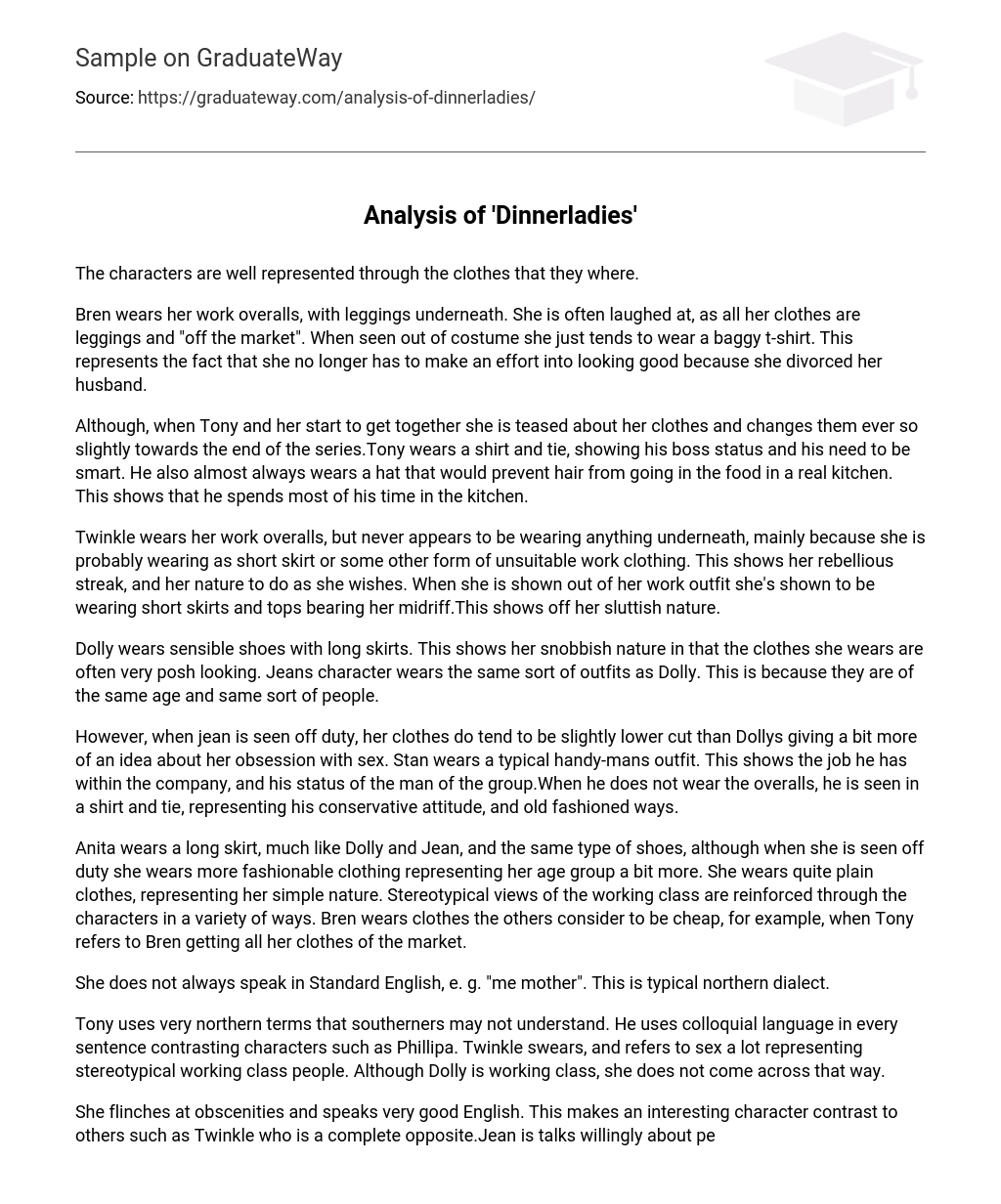The choice of attire clearly demonstrates the characters’ representation.
Bren wears her work overalls with leggings underneath, which are frequently mocked because they are all “off the market”. When she’s not in her work clothes, she typically chooses a baggy t-shirt, indicating that she no longer feels the necessity to make herself look appealing following her divorce.
As the series progresses, Tony’s partner adjusts her clothes slightly despite being teased about them. Meanwhile, Tony consistently wears a shirt, tie, and hat throughout the show. His attire not only displays his authority and desire to appear sharp but also serves the practical purpose of keeping hair away from food in the kitchen. Overall, these clothing choices signify Tony’s dominant presence in the kitchen.
Twinkle always wears her work overalls without anything underneath, which suggests she typically wears inappropriate work attire like short skirts. This displays her rebellious and free-spirited nature. When she is seen outside of her work outfit, she tends to wear revealing skirts and tops that expose her midriff, emphasizing her provocative demeanor.
Dolly and Jeans both wear similar outfits, consisting of sensible shoes and long skirts. This fashion choice reflects their snobbish nature as they often opt for posh-looking clothes. They have this in common due to their shared age and similar background.
Jean’s off-duty clothing tends to be slightly lower cut than Dolly’s, indicating her obsession with sex. On the other hand, Stan usually wears a handyman’s outfit, reflecting his job and his position as the man of the group. When he doesn’t wear overalls, he opts for a shirt and tie, representing his conservative attitude and old-fashioned ways.
Anita, Dolly, and Jean all wear long skirts and the same type of shoes. However, when Anita is not working, she wears more stylish clothing that reflects her age group. She prefers plain clothes that showcase her simple nature. The characters reinforce stereotypical views of the working class in different ways. For instance, Bren wears cheap clothes, which Tony exemplifies by mentioning that Bren gets all her clothes from the market.
She sometimes speaks in dialect, such as saying “me mother”. This is a characteristic of the northern region.
Tony’s use of northern terms may be difficult for southerners to grasp; his colloquial language sets him apart from characters like Phillipa. Moreover, Twinkle’s frequent swearing and explicit references to sex reinforce stereotypes associated with the working class. However, despite also being working class, Dolly does not conform to these expectations.
She reacts to obscenities and speaks English fluently, which creates an intriguing contrast with individuals like Twinkle, who are the complete opposite. Jean openly discusses her personal issues and her sexual life, which Dolly disapproves of, thereby conforming to the stereotype of the upper classes looking down on the working classes. Stan, with a military background, embodies a “get on with it” mentality.
This reinforces the notion that individuals who work tend to work diligently. Phillipa demonstrates her dedication to her job by wearing professional clothing. She opts for modest attire consisting of long skirts and shirts, reflecting a conservative mindset typically associated with the middle class. Additionally, her hair and makeup are always flawlessly done, further emphasizing her middle-class standing in comparison to characters like Petula.
She always maintains a positive outlook and expresses it enthusiastically through phrases like “that’s absolutely smashing” to describe even the smallest everyday things. She avoids using profanity and instead employs expressions such as “crikey I’m such a twerp.” Her speech is quite formal, incorporating words such as “smashing” and “spiffing,” which are considered outdated. Overall, her use of standard formal English indicates her affluent upbringing and level of education.
The canteen manager, Tony, has delusions of grandeur. Despite thinking he is in control, it is the women who actually run the canteen. They either ignore or complain about Tony’s instructions, adding humor to the situation as everyone ignores him.
Additionally, the play presents amusing conflicts between the characters. The relationship between Bren and Petula can be seen as that of a mother and daughter, although it doesn’t always appear that way. Roles often reverse, with Bren taking on the role of caretaker for Petula. An example of this is when Bren has to pay to repair Petula’s caravan. This creates humor as it emphasizes Petula’s helplessness.
The canteen staff has a negative opinion of Petula due to her constant attempts to obtain something from Bren, such as money or favors. Despite this, Bren continues to fulfill her mother’s requests. Bren and Tony have a laid-back relationship where it is evident that they both have feelings for each other, but neither one is willing to make the first move.
Having a good relationship is essential for them as they frequently converse, especially in close proximity areas like the canteen. This strong bond enables them to effectively handle such situations.
Both Twinkle and Jean are rebellious characters in the sitcom who defy traditional gender stereotypes for women, such as refraining from swearing. They frequently engage in conversations that revolve around topics related to sex and sexuality.
Both Twinkle and Scroty old tabard are quite manly in their speech and show no shame. Both women are not afraid to stand up for themselves to their boss and are very opinionated.





